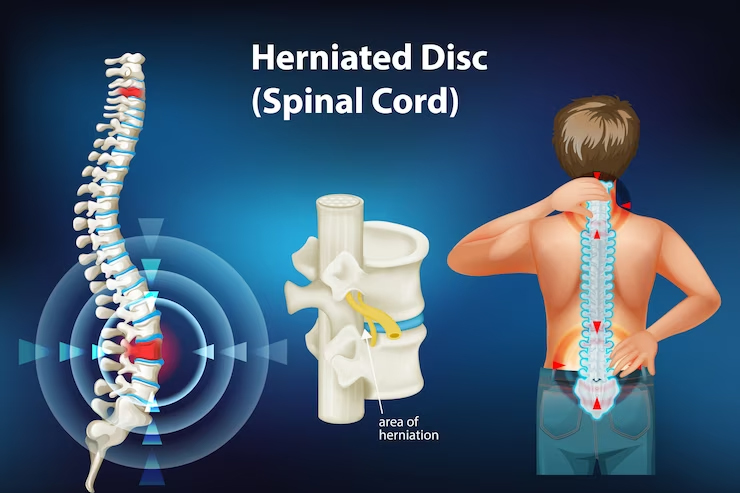
This article was published on: 05/31/23 8:50 AM
Herniated discs are a common condition that affects millions of people worldwide. Sometimes the soft tissue that cushions the vertebrae in the spine, known as the intervertebral discs, protrudes out of its normal position and puts pressure on nearby nerves or the spinal cord. A herniated disc occurs when the soft, jelly-like center of the disc protrudes through a tear in the outer layer, known as the annulus fibrosus.
The symptoms of a herniated disc can range from mild to severe and can include pain, numbness, tingling, and weakness in the affected area. Treatment options for herniated discs vary depending on the severity of the symptoms and may include physical therapy, medication, and in some cases, surgery.
However, research has shown that in many cases, herniated discs can resolve on their own without the need for medical intervention. In fact, it is estimated that around two-thirds of herniated discs will heal on their own over time.
So, what causes herniated discs to resolve on their own, and how can you increase your chances of a successful recovery? Let us take a closer look at the science behind herniated disc resolution and provide some tips for managing your symptoms while your body heals.
Why Do Herniated Discs Resolve on Their Own?
The body has an incredible capacity for healing itself, and this is particularly true for the spine. The intervertebral discs in the spine are made up of a gel-like substance called the nucleus pulposus, which is surrounded by a tough outer layer called the annulus fibrosus. When a disc herniates, the nucleus pulposus can leak out of the annulus fibrosus and put pressure on the nerves or spinal cord, causing pain and other symptoms.
However, the body has a natural defense mechanism to deal with this type of injury. When a disc herniates, the body recognizes the leaking nucleus pulposus as a foreign substance and sends immune cells to the area to break it down and remove it from the body. This process is known as resorption and can take several weeks or months to complete.
As the body breaks down the leaked nucleus pulposus, the pressure on the nerves or spinal cord is relieved, and the symptoms of the herniated disc begin to improve. In some cases, the body may even repair the damaged annulus fibrosus, further reducing the risk of future herniation.
Factors That Affect Herniated Disc Resolution
While many herniated discs will resolve on their own over time, several factors can affect the rate and success of the healing process. These include:
Severity of the herniation: The size and location of the herniation can affect how quickly the body can heal. Large herniations or those that are pressing on vital structures like the spinal cord may take longer to resolve.
Age: As we age, the discs in our spine naturally lose some of their flexibility and cushioning, making them more susceptible to herniation. However, younger people may have an easier time healing from a herniated disc due to their body’s increased ability to repair and regenerate tissues.
Overall health: Chronic health conditions like diabetes, high blood pressure, and obesity can slow down the body’s healing processes, making it more difficult for a herniated disc to resolve on its own.
Lifestyle factors: Smoking, poor nutrition, and lack of exercise can also impact the body’s ability to heal, making it important to maintain a healthy lifestyle while recovering from a herniated disc.
While your body works to heal a herniated disc on its own, there are several things you can do to manage your symptoms and improve your chances of a successful recovery.
Conservative treatment options for a herniated disc
Rest: Avoiding strenuous activity and allowing the body time to heal on its own.
Pain medication: Over-the-counter pain medication, such as acetaminophen or ibuprofen, can help manage pain and inflammation.
Physical therapy: Exercises to strengthen the muscles in the affected area can help reduce pain and improve flexibility.
Heat or ice: Applying heat or ice to the affected area can help reduce pain and inflammation.
Non-Conservative treatment options for a herniated disc
If conservative treatment options do not provide relief, medical intervention may be necessary. Medical treatment options for a herniated disc include Epidural steroid injections, and Surgery.
Epidural steroid injections: Injections of a corticosteroid medication into the affected area can help reduce pain and inflammation.
Surgery: In severe cases, surgery may be necessary to remove the herniated portion of the disc and relieve pressure on the nerves.
While Herniated discs can cause a lot of pain and discomfort, making it difficult for individuals to go about their daily lives, however, the good news is that two thirds of them resolve on their own.
Why Two Thirds of Herniated Discs Resolve on Their Own
While medical intervention may be necessary in some cases, it is important to note that two thirds of herniated discs will resolve on their own without medical intervention. This is because the body has the ability to heal itself, given time and the right conditions.
When a disc herniates, the body’s natural response is to absorb the herniated material and repair the tear in the annulus fibrosus. This process can take time, and the body needs rest and the right conditions to facilitate healing. Conservative treatment options, such as rest, physical therapy, and pain medication, can help facilitate the healing process and provide relief from symptoms.